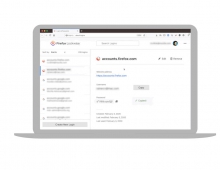
Firefox to Feature Privacy Tool Against Online Behavioral Advertising
Mozilla is seeking ways to provide Firefox users a deeper understanding of and control over the flow of personal information
online.
Mozilla is looking to the area known as "Do Not Track," which is best
understood in current policy discussions to provide a way for people
to opt-out of online behavioral advertising (OBA).
The company is proposing a feature that allows users to set a browser preference that will broadcast their desire to opt-out of third party, advertising-based tracking by transmitting a Do Not Track HTTP header with every click or page view in Firefox. When the feature is enabled and users turn it on, web sites will be told by Firefox that a user would like to opt-out of OBA.
"We believe the header-based approach has the potential to be better for the web in the long run because it is a clearer and more universal opt-out mechanism than cookies or blacklists," Mozilla said.
The Do Not Track header builds on the work the advertising networks have done to date without the cookie-based systems they make available to people online. The advantages to the header technique are that it is less complex and simple to locate and use, it is more persistent than cookie-based solutions, and it doesn't rely on user's finding and loading lists of ad networks and advertisers to work.
Mozilla's team is not the only ones who think this approach makes sense. The FTC calls for a "more uniform and comprehensive consumer choice mechanism for online behavioral advertising."
The challenge with adding this to the header is that it requires both browsers and sites to implement it to be fully effective. Mozilla said that is is taking the step of proposing that this feature be considered for upcoming releases of Firefox.
Google also on Monday released extension software for its Chrome browser that lets users opt out of being tracked by companies adopting industry privacy standards regarding online advertising.
"Keep My Opt-Outs" lets people opt out of having snippets of code referred to as "cookies" installed on their computers to track online behavior for the purpose of targeting ads.
"Keep in mind that once you install the Keep My Opt-Outs extension, your experience of online ads may change," Google product managers Sean Harvey and Rajas Moonka said in a blog post.
"You may see the same ads repeatedly on particular websites, or see ads that are less relevant to you."
"This new feature gives you significant control without compromising the revenue that fuels the Web content that we all consume every day."
Google said it is working to make the feature available to Web browsers other than Chrome.
Microsoft also plans to increase privacy options in the upcoming version of its Internet Explorer 9 (IE9) browser, including the ability to prevent tracking by third-party websites.
The US software giant said that the new feature, "Tracking Protection," is designed to "help consumers be in control of potential online tracking as they move around the Web."
The tool will be built into a test version of IE9 being released this year.
The company is proposing a feature that allows users to set a browser preference that will broadcast their desire to opt-out of third party, advertising-based tracking by transmitting a Do Not Track HTTP header with every click or page view in Firefox. When the feature is enabled and users turn it on, web sites will be told by Firefox that a user would like to opt-out of OBA.
"We believe the header-based approach has the potential to be better for the web in the long run because it is a clearer and more universal opt-out mechanism than cookies or blacklists," Mozilla said.
The Do Not Track header builds on the work the advertising networks have done to date without the cookie-based systems they make available to people online. The advantages to the header technique are that it is less complex and simple to locate and use, it is more persistent than cookie-based solutions, and it doesn't rely on user's finding and loading lists of ad networks and advertisers to work.
Mozilla's team is not the only ones who think this approach makes sense. The FTC calls for a "more uniform and comprehensive consumer choice mechanism for online behavioral advertising."
The challenge with adding this to the header is that it requires both browsers and sites to implement it to be fully effective. Mozilla said that is is taking the step of proposing that this feature be considered for upcoming releases of Firefox.
Google also on Monday released extension software for its Chrome browser that lets users opt out of being tracked by companies adopting industry privacy standards regarding online advertising.
"Keep My Opt-Outs" lets people opt out of having snippets of code referred to as "cookies" installed on their computers to track online behavior for the purpose of targeting ads.
"Keep in mind that once you install the Keep My Opt-Outs extension, your experience of online ads may change," Google product managers Sean Harvey and Rajas Moonka said in a blog post.
"You may see the same ads repeatedly on particular websites, or see ads that are less relevant to you."
"This new feature gives you significant control without compromising the revenue that fuels the Web content that we all consume every day."
Google said it is working to make the feature available to Web browsers other than Chrome.
Microsoft also plans to increase privacy options in the upcoming version of its Internet Explorer 9 (IE9) browser, including the ability to prevent tracking by third-party websites.
The US software giant said that the new feature, "Tracking Protection," is designed to "help consumers be in control of potential online tracking as they move around the Web."
The tool will be built into a test version of IE9 being released this year.





















